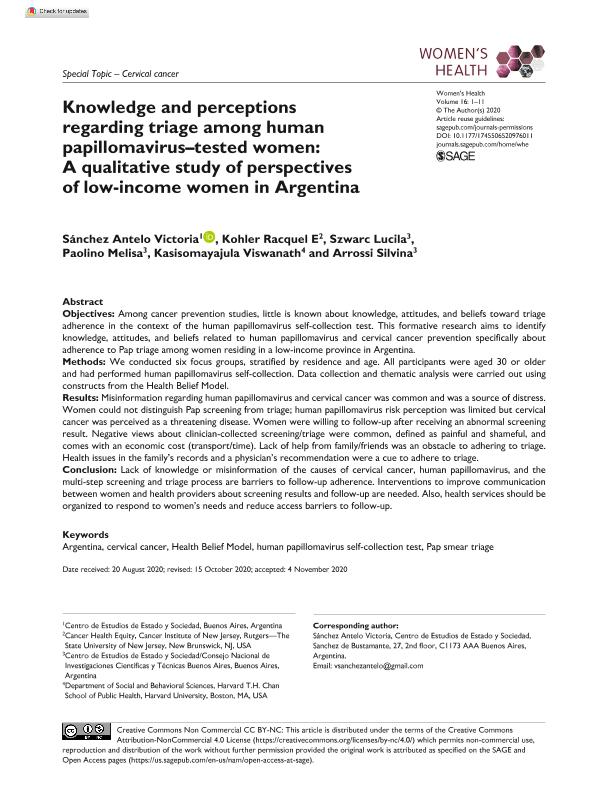Artículo
Knowledge and perceptions regarding triage among human papillomavirus–tested women: A qualitative study of perspectives of low-income women in Argentina
Sánchez Antelo, Victoria Inés María ; Kohler, Racquel; Szwarc, Lucila
; Kohler, Racquel; Szwarc, Lucila ; Paolino, Melisa Delia
; Paolino, Melisa Delia ; Viswanath, Kasisomayajula; Arrossi, Silvina
; Viswanath, Kasisomayajula; Arrossi, Silvina
 ; Kohler, Racquel; Szwarc, Lucila
; Kohler, Racquel; Szwarc, Lucila ; Paolino, Melisa Delia
; Paolino, Melisa Delia ; Viswanath, Kasisomayajula; Arrossi, Silvina
; Viswanath, Kasisomayajula; Arrossi, Silvina
Fecha de publicación:
12/2020
Editorial:
Sage Publications Ltd
Revista:
Women's Health
ISSN:
1745-5057
e-ISSN:
1745-5065
Idioma:
Inglés
Tipo de recurso:
Artículo publicado
Clasificación temática:
Resumen
Objectives: Among cancer prevention studies, little is known about knowledge, attitudes, and beliefs toward triage adherence in the context of the human papillomavirus self-collection test. This formative research aims to identify knowledge, attitudes, and beliefs related to human papillomavirus and cervical cancer prevention specifically about adherence to Pap triage among women residing in a low-income province in Argentina. Methods: We conducted six focus groups, stratified by residence and age. All participants were aged 30 or older and had performed human papillomavirus self-collection. Data collection and thematic analysis were carried out using constructs from the Health Belief Model. Results: Misinformation regarding human papillomavirus and cervical cancer was common and was a source of distress. Women could not distinguish Pap screening from triage; human papillomavirus risk perception was limited but cervical cancer was perceived as a threatening disease. Women were willing to follow-up after receiving an abnormal screening result. Negative views about clinician-collected screening/triage were common, defined as painful and shameful, and comes with an economic cost (transport/time). Lack of help from family/friends was an obstacle to adhering to triage. Health issues in the family’s records and a physician’s recommendation were a cue to adhere to triage. Conclusion: Lack of knowledge or misinformation of the causes of cervical cancer, human papillomavirus, and the multi-step screening and triage process are barriers to follow-up adherence. Interventions to improve communication between women and health providers about screening results and follow-up are needed. Also, health services should be organized to respond to women’s needs and reduce access barriers to follow-up.
Archivos asociados
Licencia
Identificadores
Colecciones
Articulos(SEDE CENTRAL)
Articulos de SEDE CENTRAL
Articulos de SEDE CENTRAL
Citación
Sánchez Antelo, Victoria Inés María; Kohler, Racquel; Szwarc, Lucila; Paolino, Melisa Delia; Viswanath, Kasisomayajula; et al.; Knowledge and perceptions regarding triage among human papillomavirus–tested women: A qualitative study of perspectives of low-income women in Argentina; Sage Publications Ltd; Women's Health; 16; 12-2020; 1-11
Compartir
Altmétricas



